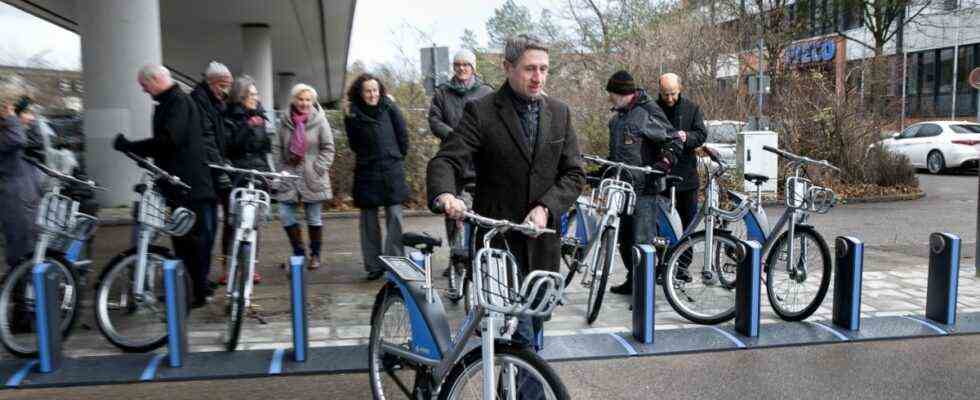It has never been so easy to get on a bike in the district. You don’t even have to have your own with you. Anyone who has the Münchner Verkehrsgesellschaft app on their mobile phone can spontaneously set off from 162 stations with an MVG rental bike. But three years after entering the beautiful new bicycle world with the Munich transport company as a partner, the bike is no longer running smoothly. The number of loans fell in the Corona year 2020. In many town halls you also feel that the MVG has slowed you down when expanding the loan system. You can even introduce yourself to new partners.
The decline in loan numbers in most municipalities in 2020 is sobering, but also explainable. People sat at home in lockdown. They worked at the kitchen table and on the side taught their children as best they could. Who needs a rental bike? The universities in Garching and Neubiberg were also orphaned. The MVG bikes were not borrowed more often in March 2020 than in March of the previous year, although only a few stations were set up at the beginning of 2019. In July 2020, there were 6,700 loans, around half of the previous year. It was similar in the dreary winter months. In Unterschleißheim, ten percent fewer loans were recorded over the year, in Ismaning 24 percent and in Oberhaching even just under 40 percent. Clear outliers are Grünwald, where the MVG bikes were used 25 percent more than before despite Corona, and in Oberschleißheim with an increase of even 70 percent.
The MVG is having a hard time with an explanation for this leap in the two municipalities. There are a few ideas in town halls. The castle community in the north and the Isar valley community in the south experienced an onslaught of day trippers from Munich precisely because of the pandemic. The deputy main office manager Rudi Peinelt in Grünwald vividly remembers the overcrowded Isar floodplain with rubbish and other unsightly excesses. The number in 2020 also increased that the large rental station at Derbolfinger Platz only opened in August 2019, he explains. The Oberschleißheim town hall spokeswoman Doris Rohe points out that in 2020 the number of loans at the Helmholtz Center near Munich’s city limits increased sharply. For many employees, it was probably an option to come straight to work by bike. Buses and trains were also not opportune for reasons of infection protection.
Actually, with a more relaxed Corona situation, things could go up again with the MVG bikes in the Munich district. But the mood is clouded. Because borrowing has become significantly less attractive since March 2021 because the MVG insists that the bikes be parked at a station again. Otherwise a penalty fee of 20 euros will be charged. The MVG wants to discipline the borrowers and reduce costs that arise from collecting the bikes. Ismaning’s Mayor Alexander Greulich (SPD) expects that this will deny people the use of rental bikes. “I fear the system will break,” he says. Who should borrow another bike if they have been fined 20 euros twice?
The success that the MVG had hoped for has apparently already been achieved. There are fewer bikes standing around wildly, has observed Günter Rudolf, treasurer in Haar, who is responsible for public transport issues in the town hall. “You can see it on the streets,” he says. Whether this is only due to increased discipline or whether the number of loans has decreased again since March 2021, when the fee was introduced, cannot yet be answered. Numbers for this year are expected in town halls in early 2022 at the earliest.
However, some mayors want to see progress. They insist on the introduction of so-called regulated, station-independent loan and delivery options. And they insist that e-bikes and cargo bikes will soon also be available for hire in their communities. The MVG is defensive about this. A spokesman says that what concerns a further development of the system in the district is oriented “to the wishes and needs of the users, but at the same time also to the economic efficiency”. In the northern municipalities, political pressure is now being used to get the MVG moving. Unterschleißheim’s mayor Christoph Böck (SPD) reports corresponding appeals to Munich’s Mayor Dieter Reiter (SPD). The northern municipalities in the district have also put out feelers to other mobility providers as to whether it would be possible to work with them on e-bikes and cargo bikes, for example. With a positive result: “Some things seem to be easier there,” says Ismaning’s Mayor Greulich. Böck: “We are not married to the MVG.”

